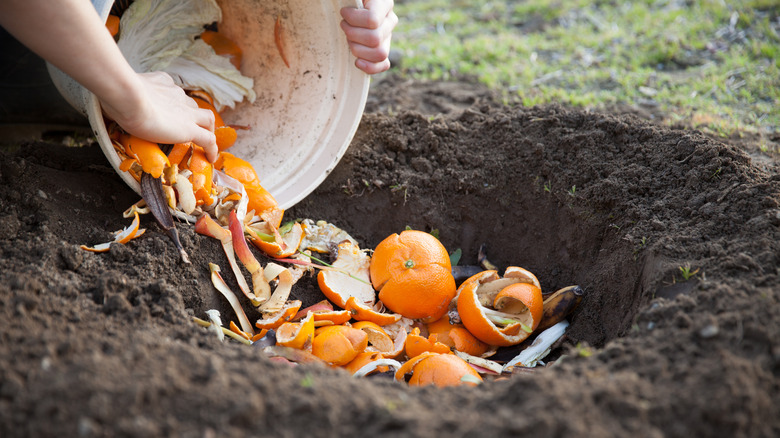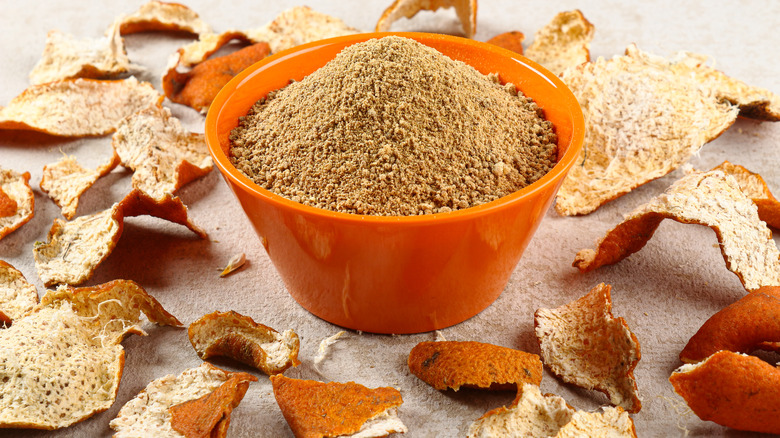Why Do People Use Orange Peels In The Garden, And Can They Help Plants Grow?
Gardeners are always looking for creative ways to help their plants thrive, and natural methods are often preferred. Some people use orange peels to keep pests out of plants, while others repurpose these kitchen scraps to make a natural fertilizer or add it to their compost. You may be concerned that orange peels will take too long to break down or that they might not contain enough nutrients to make a good fertilizer. However, studies have actually shown that orange peels can help to adjust the pH levels of your garden's soil, provide numerous vital nutrients for plants, and can cause plants to grow taller. This is why orange peels are in fact able to help plants grow.
Because orange peels are acidic, they are capable of adding a little acidity for plants that like it. Additionally, orange peels can be particularly helpful for plants that need more nitrogen. By using these food scraps to fertilize your garden, you can help the plants in your garden thrive while saving money on fertilizer and cutting down on kitchen waste at the same time. Here's more on how orange peels benefit plants and how you can use them in your garden.
The science behind orange peels as plant fertilizer
In a 2021 study published by the International Journal of Environmental and Rural Development, research showed that orange peels can add vital nutrients to the soil. These included nitrogen, potassium, and phosphorous, which are common main ingredients in fertilizers, as well as the micronutrients zinc, iron, and calcium. Additionally, the study also found that pea and chili plants grown in soil with powdered orange peels were taller than the same plants grown in soil without the natural fertilizer after 45 days. Because of this, it was concluded that orange peels are good for horticultural purposes and can improve soil morphology.
Another 2016 study conducted by the L.D. College of Engineering combined dried and powdered orange, pomegranate, and lime peels with water to give to plants. The results showed the soil had increased nitrogen as well as other nutrients, and that the fruit peels could help to regulate the pH of the soil by increasing acidity. This could be why this kitchen scrap is the secret to thriving hydrangeas. Additionally, a 1995 study published by Bioresource Technology also found that orange peels can be an effective fertilizer and that they showed no signs of phytotoxicity or issues with the plant's growth. Therefore, this food waste that's typically thrown away could be very beneficial for your plants.
Using orange peels in the garden to help plants grow
If you want to make your own garden fertilizer from orange peels, begin by drying them out and processing them into a powder. This can then be mixed into your soil to help your plants or possibly added to their water. Since different plants have varying nutritional needs, test your soil before adding orange peels to your garden to ensure you're meeting the needs of your plants. In the L.D. College of Engineering study, the peels were left to dry in the sun for over 20 days and then ground into a fine powder. You could allow your peels to air dry or leave them in the sun, but it may be possible to speed up the process by placing the peels in the oven at 275 degrees Fahrenheit for about an hour and a half. Then, throw your peels in a blender to make your powdered fertilizer.
Alternatively, you could compost your orange peels to make a rich, natural fertilizer. Further, some online sources suggest soaking your orange peels in water for a few days before pouring it over your plants. While this is unlikely to cause harm, it might not provide as much nutrients as using the peels themselves. Additionally, other sources mention combining the orange peels with water and a little vinegar, but the acetic acid in vinegar can harm or kill some plants, so this may not be the best idea.


